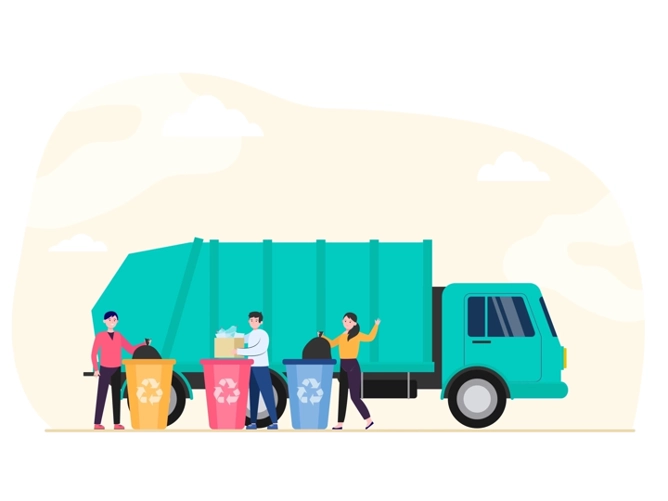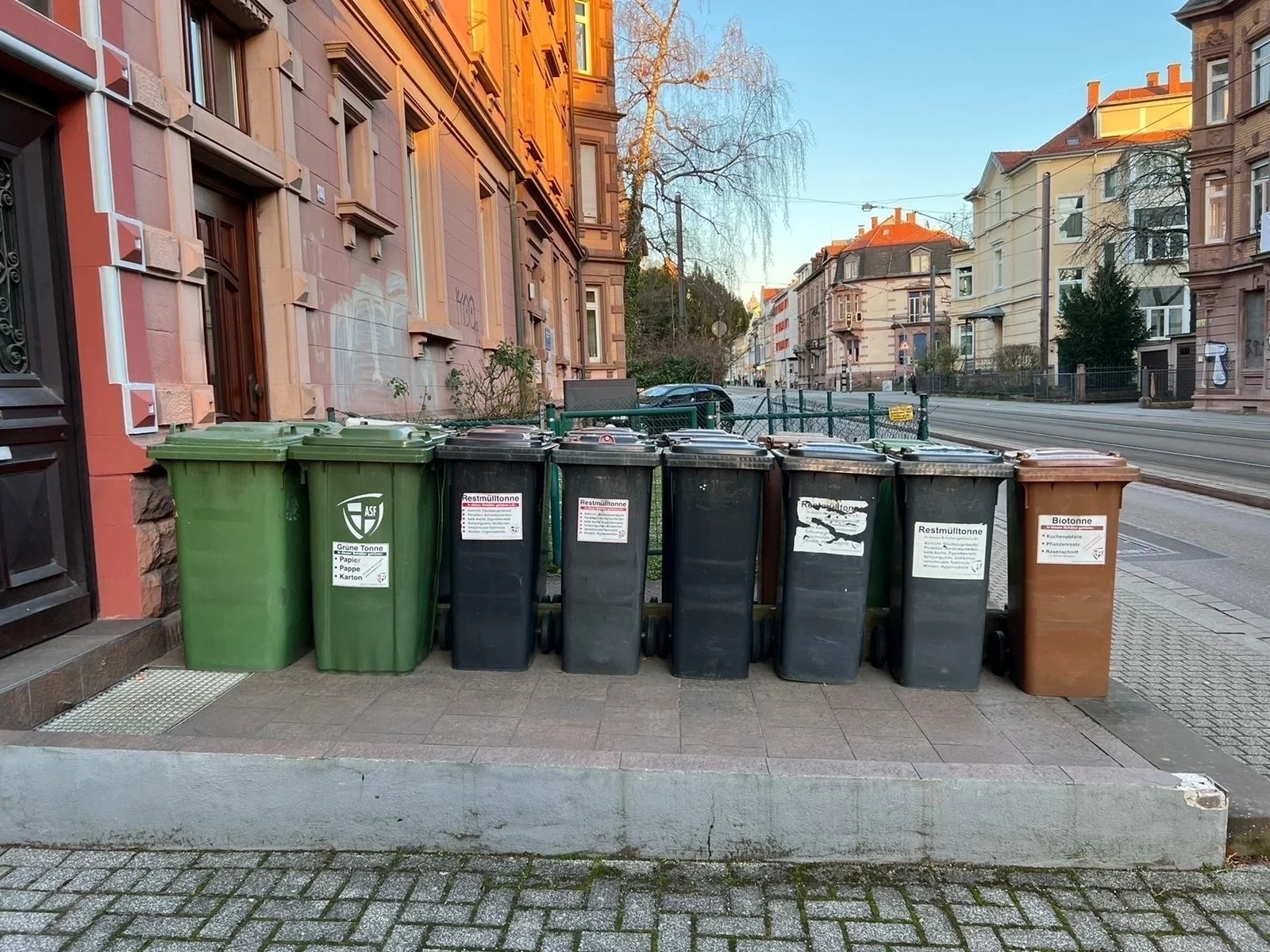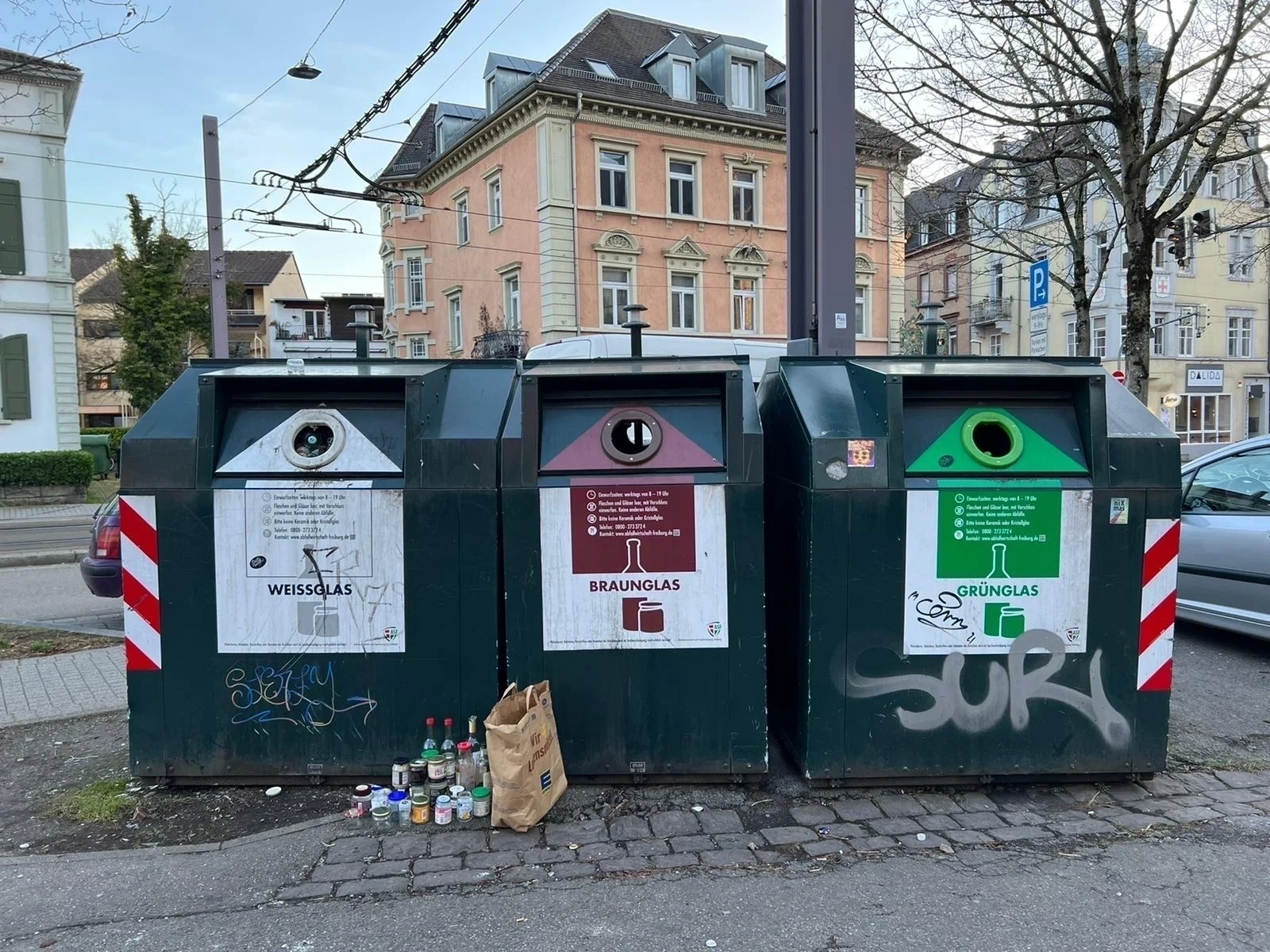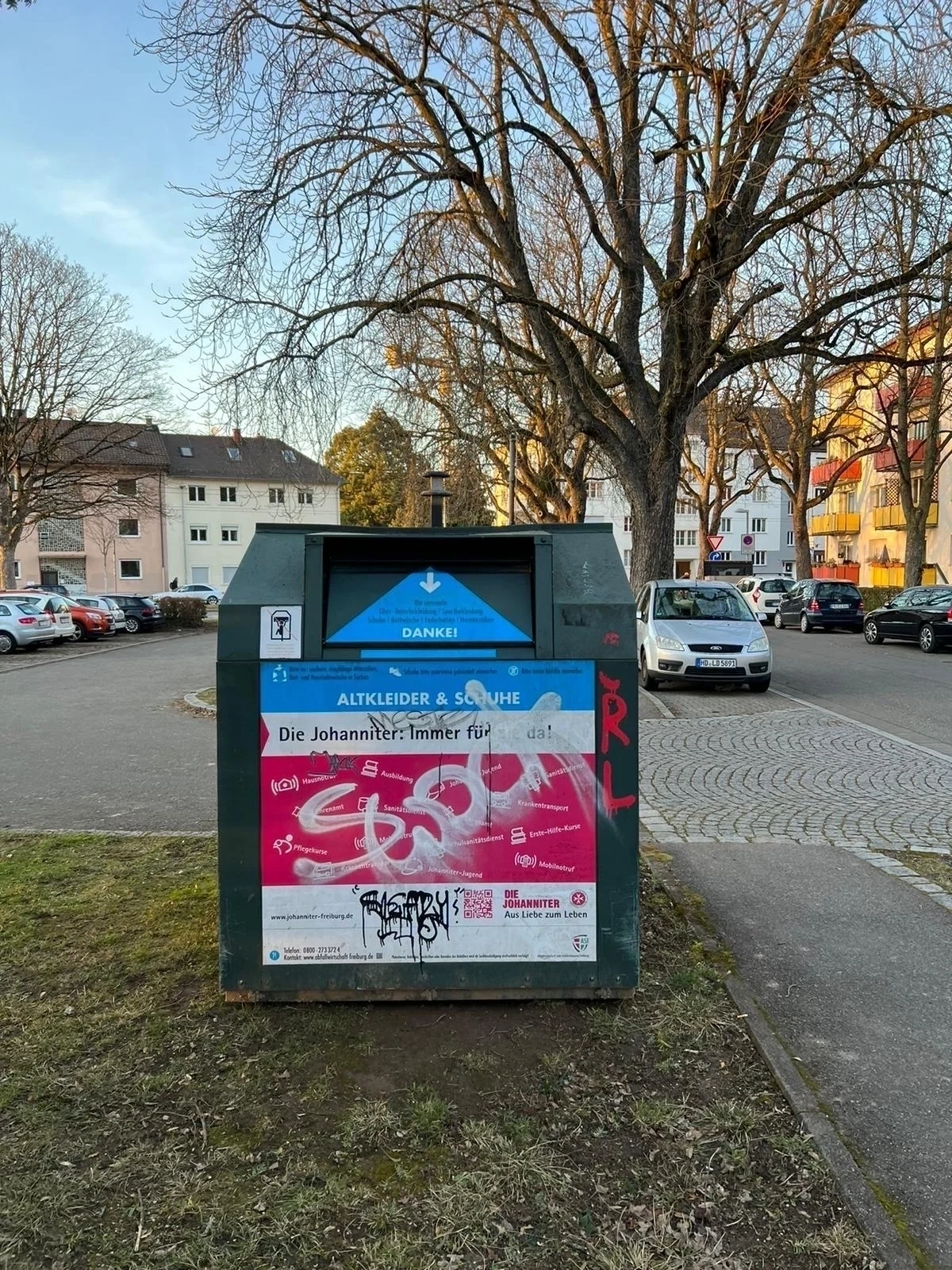
How Do Germans Dispose and Recycle Trash? [2026 Guide]
Our goal at this platform is to alleviate some of the stress that comes with moving to Germany for the first time by making the process of navigating the country’s bureaucracy and culture as simple as possible. This is your one-stop shop for all things trashy in Germany.
You’ll have a lot of questions when you get to Germany on how to separate the trash. In Germany, recycling is more than just a fad. Why does Germany have the world’s best recycling rate? Germany was the top municipal waste recycler in the European Union in 2022, with an estimated recycling rate of 69.1 %
German per capita household waste amounted to around 438 kilograms in 2022, based on preliminary figures. People in southern Germany produce significantly less garbage per capita than those in northern Germany, which is worth noting.
Why Does Germany Recycle Well?
German trash separation (Mülltrennung), on the other hand, is thorough and taken seriously. However, the Germans themselves are equally responsible for enforcing rigorous governmental and state rules. It’s almost as if properly sorting rubbish was ingrained in my veins as a child. Because of this, I’m happy to assist you in your search for trash removal services in Germany.
The number of trash can receptacles in a typical German home varies widely.
The following three to four trash bins are frequent in German homes:
How Is Trash Separated in Germany?
Start separating your waste immediately after you produce it. You’ll either get a fine or your trash won’t be picked up if you don’t separate your trash afterwards, which isn’t fun.
As a model German resident, how do you separate your waste at home? A closer examination of each trash bin colour follows.

The Blue or Green Trash bin Is for Paper and Cardboard
Depending on the state, the blue and green colour is for paper waste. In the south, we have seen green containers for papers. So basically, every paper product that is clean and dry goes in the paper trash bin. (Blaue Tonne oder Grune Tonne).
Exactly what does the blue or green trash bin have a place for?
- Writing and Addressing Correspondence
- Newspapers
- Magazines
- Boxes of eggs
- Carton Packaging (folded)
What Shouldn’t Go in The Blue Container?
- A yellow bin is where you put beverage cartons.
- A black bin is where you put paper towels.
- Cardboard that has been soiled with food debris results in a “black bin.”
- Special enormous carton containers in your neighborhood streets \= giant carton shipping crates.
Plastics and Soft Metals in a Yellow Bin
The yellow bin (Gelbe Tonne) or yellow bag should be used for any rubbish and packaging made of plastic, soft metal, or coated paper with the Green Dot (Der Grüne Punkt) (Gelber Sack). Before putting food in a container, make sure it is clean or rinsed.
Do You Know What Goes in The Yellow Recycling Bin?
- Bottles made of plastic that do not require a deposit
- Cans with no down payment requirements
- Cartons and Tetra-packs of milk and juice
- Containers for yoghurt
- Cartons of alcoholic beverages
- The foil of aluminum
- Tins
What Is Not Allowed in The Yellow Bin?
- Batteries are in a class of their own
- Special canisters for light bulbs
- Styrofoam is a black bin.
Organic/Bio Waste in Green/Brown Trash Bin
If it is biodegradable, it should go in the brown or green trash bin. The colour of the trash bin depends upon your state.
What goes in the organic recycling bin?
- Filters and coffee grinds
- Eggshells
- Remaining food from a meal
- Skin of fruits and vegetables
- Flowers, grass, and other garden waste are examples of this.
What Is not included in the organic recycling bin?
- ashes in black trash bin
- Dirt in general is equivalent to waste in a black bin.
- Litter box for pet waste
In 2015, Germany introduced the Biotonne or Organic trash bin which should be in every household
Residual Waste is contained in the gray/black bin
For all other rubbish, including sanitary products, the German grey or black trash container (Restmüll) is appropriate.
Bottles of Glass
To properly dispose of wine and spirit bottles or smaller jars and oil bottles, you must separate them from other waste. You’ve probably seen large containers with holes all throughout the town. You’ll find your glass bottles here, separated from one other by a variety of brown, white, and green glass.
If you don’t know the location of these in your city then search with “Glascontainer + Your city”. You will probably find your city’s waste management company’s website. On this site, you will find a map with all the locations of these glass containers. You can find the nearest one and through your glass here.

The Waste Management Calendar in Germany
Every year, each city issues a waste management calendar which is called Abdallkalender in German. Usually, it is delivered to each resident or if it is not delivered then you can find it on the website of the local waste management authority.
In this calendar, they clearly state the days for each type of garbage. It outlines the days and times that your neighbourhood’s various garbage containers will be collected. Besides this, they also mention the proper methods for disposing of specific types of waste. Here is the pdf file of one of the city Freiburg, you can check that out for reference.
Those containers must be placed on your front sidewalk the night before the scheduled pickup. Early in the morning, a garbage truck (Müllabfuhr) will drive past. Having a neighbour or janitor take care of this is common in apartment complexes.
Some Local waste management company also offers an app with a digital garbage guide for residents the city.
If you live in a big city, like the ones, we mentioned below then, you can design your own waste pickup schedule, or you may just Google ‘Abfallkalender + city name.’ In order to receive the calendar, you must input your exact street address of your city
Recyclable waste fines in Germany
If you break the regulations, you’re going to get hit with a hefty fine. The German Fine Catalog (Bußgeldkatalog) provides a list of all fines for breaking German regulations and legislation. The fines are handled differently in each German state. Getting a fine of 10-1.500 euros for breaking the laws and dumping your rubbish in a way that doesn’t allow recycling is possible.
Which facts do I need to know about the deposit? [Pfand]
Not all Plastic and glass bottles should be thrown away. When you buy a bottle or can of any drink, then you pay 25 cents deposit on that bottle. It is called “Pfand” in German, you can easily spot that on the receipt of your purchase.
These Pfand products can be returned to any supermarket like Rewe, Edeka. They have Pfand machines, where you can place the bottle and the machine will suck the bottles in. After returning them, you’ll receive a refund of 8-25 cents for each of these things.
Where to throw Light Bulbs, Electronics, and Batteries in Germany?
Electrical devices cannot be disposed of in your standard garbage bin. They can only be disposed of at one of several designated locations to ensure that they may be recycled properly.
Bigger electronic items can be disposed of at electronic markets like Mediamarkt or Saturn. They can also be disposed of at the hardware stores like OBI or Bauhaus.
Luckily for small batteries, you do not need to go to the above-mentioned markets. You can simply dispose of them at any local supermarket like Edekla, Lidl or Aldi.
Old Shoes and Clothes
In Germany, how do you dispose of your old clothing? Donating your old clothing and shoes can be done in a variety of ways.
You’ll see a large container for clothes right next to the glass and cardboard containers on the streets in your neighborhood (Altkleidersammlung). To ensure the safety of your clothing, put it in a bag and seal it shut.
Pack your old clothes in a box and drop them off at your local post office for free to the German Clothing Foundation. The weight range for the shipment must be between 5 kg and 31,5 kg. A maximum of two old cellphones or tablets can be placed in each box.

Lacquers and Paint
The same rules apply to paint and lacquer residue as they do to electronic components. It’s best to get them professionally disposed of at your local hardware store. You can give them to Obi and Hornbach, for example.
Disposal of Christmas Trees
Yes, Germans have a thing with genuine Christmas trees. Isn’t it funny how much we like decorating our genuine Christmas tree with real candles? Since we’re on the subject of trash separation, how do Germans get rid of their Christmas trees? Look at your city’s Abfallkalender. There will be a certain day and time for each community to be picked up. You must place your Christmas tree on the sidewalk in front of your house the night before the pickup.
Furniture and other large objects
Sperrmüll is a contentious topic among Germans. “Bulky garbage” refers to anything that doesn’t fit in the ordinary trash bin, such as furniture and large appliances (such as washing machines and refrigerators).
Why are we in a love-hate situation? We have Sperrmüll-related problems in Germany since some residents don’t comprehend how it works. Wow, that sounded a lot worse than it actually was. Let me clarify.
Your local garbage removal service is the best approach to getting rid of your old furniture and other large items. To get rid of your unwanted items, you tell them what you want to get rid of and when you want it taken away. Everybody in a neighborhood usually gets the same date.
All the items will be placed on the sidewalk in front of each home on the night before they are picked up. This night, your neighborhood will be littered with strangers who will be sorting through everyone’s belongings and loading them into their Sprinter vans to be sold somewhere.
Unwanted items can sit on the curb for days or weeks, since some people don’t call in advance to arrange for pick-up.
This service is available in some cities for a fee, while in others, it is free. If you sign up for free pickup in Düsseldorf, where we live, and place less than a two-meter cube of things in front of your house, the pickup is free. The penalty for improperly disposing of Sperrmüll is up to 2.500 euros.
Conclusion
If you have any questions or concerns, please don’t hesitate to contact us. You now know that Germany’s comprehensive and stringent waste separation system makes it the world champion when it comes to recycling waste.
In addition to the government and city councils, your German neighbours also enforce it. If your neighbour spots you dumping trash into the household bins without separating it, don’t be shocked if they give you a lecture. Waste separation is beneficial, so please look at this as a learning opportunity.
Source: Trash truck vector created by pch.vector – www.freepik.com

Jibran Shahid
Hi, I am Jibran, your fellow expat living in Germany since 2014. With over 10 years of personal and professional experience navigating life as a foreigner, I am dedicated to providing well-researched and practical guides to help you settle and thrive in Germany. Whether you are looking for advice on bureaucracy, accommodation, jobs, or cultural integration, I have got you covered with tips and insights tailored specifically for expats. Join me on my journey as I share valuable information to make your life in Germany easier and more enjoyable.


![Best Apps to Learn German [Free + Paid]](https://liveingermany.de/images/best-app-to-learn-german/best-top-free-and-paid-learn-german-app-with-pros-and-cons.svg.webp-668w.webp)


